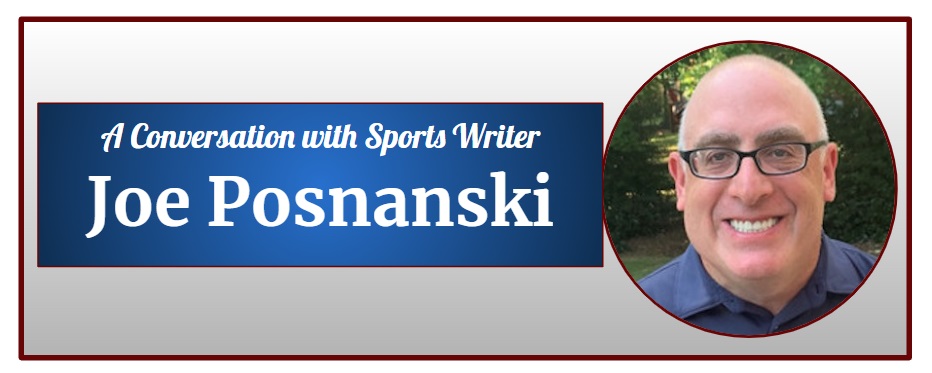Q&A with REA: A Conversation with Sports Writer Joe Posnanski
PJ Kinsella — August 27 2024

Joe Posnanski is one of the most recognizable names in American sports journalism, having spent years covering baseball, football and even the Olympic Games for Sports Illustrated, NBC Sports, MLB.com and MLB Network, among others. He also runs his own website, JoeBlogs, which details many of his experiences as a national sports reporter. Most recently, he contributed to the upcoming documentary The Diamond King that explores the history of baseball through the works of legendary baseball artist Dick Perez. Joe was kind enough to sit down with REA for this Q&A to discuss his expansive career, the evolving sports landscape and his sports Mount Rushmore.
Part of your success as a national journalist has been your passion for sports. How did you become such a fervent fan and tell us about some of your favorite moments growing up as a sports fan?
I honestly don't remember a time when I wasn't passionate about sports. I'm sure some of it came from my father, who had been a semi-professional soccer player in Poland and was fascinated by all sports. But I also just think that I always had a mind that locked onto baseball or football or basketball or whatever else was in season. I honestly don't remember a single sport that I wasn't interested in while growing up.
When people ask me about my favorite sports fan moments growing up, I always say: "Well, I grew up in Cleveland," and they usually nod knowingly. There weren't too many triumphant moments for me as a Cleveland fan. But I loved sports just the same. Collecting cards — particularly baseball cards, but also other sports — was such a big part of my sports fanhood. The first cards I ever passionately collected was the 1976 Topps baseball set, and I remember that the Boog Powell card was the only one I needed to complete my set of Cleveland (then) Indians. The thrill of finding that Boog Powell card finally was one of the greatest sports moments of my childhood.
You’ve received numerous awards and accolades throughout your career, including National Sportswriter of the Year by the National Sportscasters and Sportswriters Association (NSSA). What advice do you have for young writers or even aspiring broadcasters looking to get into the competitive world of sports journalism?
It was a lot different for me going into sports journalism than it is now — when I was starting out, the only route was really through newspapers (for writers) or through high school/college/minor league broadcasting opportunities. It's a lot different now, so I don't know how much I can offer as far as specifics go.
What I say to aspiring sports journalists, whatever their interest, is that the most important two things are (1) endless curiosity and (2) to utterly love what you do. In a lot of ways, the second one of those is really the only thing that matters because if you truly love to write or truly love to broadcast games, you will do anything, go anywhere, and work relentlessly so you can keep doing it. For me, once I realized that I wanted to be a sportswriter, I lived with this enormous fear that I wasn't good enough to do it. It was that fear that drove me to take every assignment, be more assertive, ask the extra questions, and write nonstop. Whatever success I've had, I think, boils down to me trying to overcome that fear.
You have covered a range of major sporting events and released several best-selling books during your career. What is the most memorable event that you’ve covered and what has been your favorite project during your career?
The most memorable event I've ever covered, without question, was the Greco-Roman Wrestling Olympic final at the Sydney Olympics in 2000 when Rulon Gardner upset the great Russian Alexander Karelin. I've written at great length about that incredible day so I don't want to go into all that detail here, but I will say that it's fitting that the greatest sporting event I've ever seen involved a sport where I still do not know the rules.
I've been lucky enough to be involved in a number of absolutely incredible projects. A few years ago, I worked with my friend Jonathan Hock to produce the movie they show daily at the Baseball Hall of Fame called "Generations of the Game." And I've just been working on this amazing movie about Dick Perez and his baseball art. But the greatest project I've ever worked on and will ever work on was undoubtedly my first book, "The Soul of Baseball," where I traveled around the country with Buck O'Neil.
You mention in one of your JoeBlog posts that “the Olympics are like nothing else in sports journalism.” With this year being an Olympic year, tell us as a journalist, what differentiates the Olympic experience from other major sporting events that you’ve covered? Do you have any notable pieces of Olympic memorabilia or even keepsakes in your collection?
I'm not one to keep memorabilia generally, but when you go to the Olympics you just naturally collect all sorts of cool pins and credentials and knickknacks and I do keep those. I also, for some reason, have a lot of Olympic backpacks.
I think for a journalist, the thing that makes the Olympics different is that it's this self-contained world. You go to the Olympics and everything else in the world just sort of disappears. For three or so weeks, there are no other sports, there are no movies, there is no other news. The only thing that matters at all is that table tennis match you're going to at 11 AM followed by the diving preliminaries at 2 PM followed by the Italy-Croatia women's basketball game at 5 PM and so on. You are in your own universe, and it's all sports, and it's all these athletes who have dedicated their lives to being here, and it's wonderful.
Later this year, The Diamond King documentary will be released and will detail the history of baseball through the works of legendary artist Dick Perez, and you’ve been working behind the scenes with Dick along with filmmaker Marq Evans. What has that experience been like and what impact did Dick Perez’s work have on you as a fan and a professional in the sports industry?
It has been a real thrill for me to work with Marq on this movie. It's funny, I so vividly remember collecting the Donruss Diamond Kings cards — I still see the Len Barker Diamond King in my mind — but I never knew that Dick was the one who painted them. And I certainly never knew about Dick's remarkable story and connection with baseball. The first thing Marq did was send me two books with all of Dick's baseball art, and I just sat there with my wife for hours astonished at the breadth and depth of Dick's work. All of baseball is right there. And as I went through it, I noticed that some of the paintings were familiar…I knew this work, it was a part of my baseball experience, but I had just never realized that Dick had done it all.
You’re in charge of creating the Mount Rushmore of American Sports. What four iconic sports figures are you including and why?
Wow, across all of American sports? Yikes. Usually I get asked this question for one sport.
OK, so let's see here: The first four names that came to mind were Babe Ruth, Jackie Robinson, Michael Jordan and Muhammad Ali. But if we're doing all sports, we can't (1) have two baseball players and (2) have nobody from football, right?
So, OK, how about Babe Ruth, Michael Jordan, Tom Brady and Muhammad Ali.
But am I really going to have a Mount Rushmore without Jackie Robinson? That seems almost sacrilegious. But I can't have one without Babe Ruth. And honestly, how can we have one without Satchel Paige or Joe DiMaggio. And now that I think about it, is Tom Brady really the right guy for football? What about Jim Brown? What about Jerry Rice? What about Johnny Unitas?
And maybe it shouldn't be Jordan for basketball, as titanic as he was. I mean, Kareem Abdul-Jabbar should be on Mount Rushmore, no? How much more does LeBron have to do to be on Mount Rushmore? What about Magic Johnson?
And, wait, no Tiger Woods? No Jack Nicklaus? No Serena Williams? No Chris Evert?
And no Olympic heroes? Where's Michael Phelps? Katie Ledecky? Carl Lewis? Mary Lou Retton? Jackie Joyner Kersee?
This is an unfair question is my final answer.
